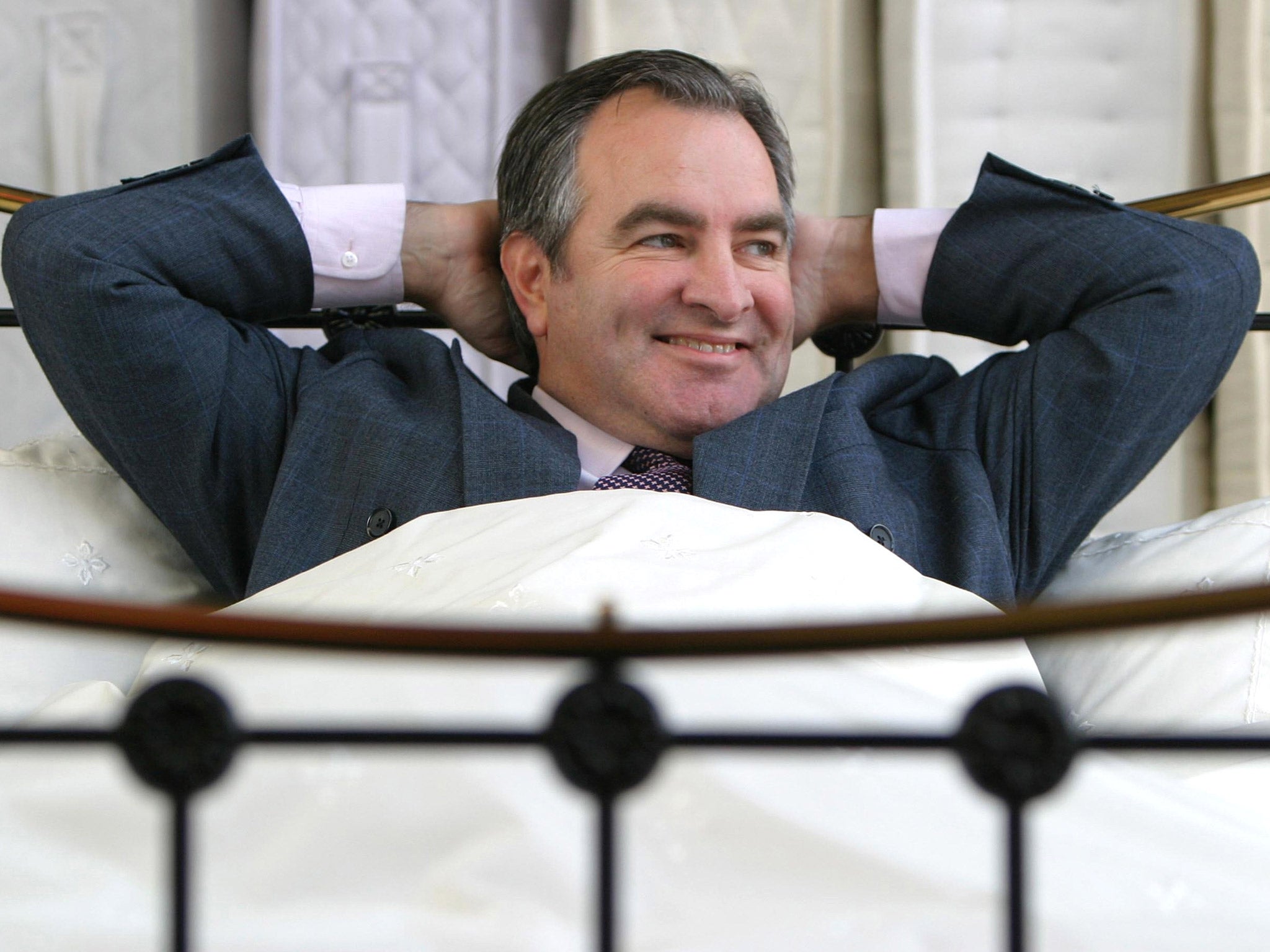Mike Clare's dream of a buy back
The bed retailer's founder is determined to retake control of his baby, even though it is in a far sicklier condition than when he sold it in 2008

Mike Clare, the found-er of Dreams, set himself and his wife up for life when they sold the UK's biggest bed retailer in a deal worth £222m to the private-equity firm Exponent in early March 2008.
Almost exactly five years later, Mr Clare is gunning to buy back the retailer he founded by 1985 after the chain was put up for sale in December.
But ahead of final-round bids on Friday, he finds his beloved baby in a far more sickly condition than when he sold it before the credit crisis started to hit spending on big-ticket items.
While Dreams delivered robust sales over Christmas, the retailer made a loss last year, and now has debts of £38m and a bloated estate of 265 stores after a rapid expansion under Exponent's ownership.
Despite this, Dreams attracted four genuine bidders by the first-round deadline of 8 February, including billionaire Sir Philip Green, the owner of Topshop and Bhs. The other suitors were Sun European Partners, which owns sofa chain ScS, and the private-equity arm of Royal Bank of Scotland, Dreams' main bank.
However, sources believe the two front-runners ahead of this week's final deadline are now Mr Clare, whose bid is backed by the US private-equity firm Apollo, and Sun European.
While Sir Philip, pictured right, is thought to be still weighing up his options, his interest is understood to have waned.
It has also been speculated that RBS private-equity arm's involvement could be providing a backstop if the other bids fail to come through at an appropriate price for the bank. All parties declined to comment on the sale process, which is being run by the accountancy firm Ernst & Young.
Whoever ends up seizing control of Dreams will get it at a bargain basement price compared with Mr Clare's bumper payout in 2008.
With the value of the chain's equity having been all but wiped out, including Mr Clare's existing 10 per cent, the price paid by a new owner will largely comprise of debt.
In additon to RBS, this is held by Barclays and Portigon, formerly WestLB. It is also likely – but not certain – that Dreams will be put through a pre-pack administration, the pre-negotiated sale of an insolvent business, which would enable a new owner to shed the worst-performing stores.
Matt Piner, the research director at Conlumino, the retail consultancy, said: "One of the reasons the process seems to have dragged on is that some of the remaining bidders may be waiting to put it through some form of administration process.
"This would enable them to get it at a lower price and give them a freer rein to reduce Dreams' store estate," he added.
But sources point out that a restructuring, such as a pre-pack administration, could do serious damage to Dreams' relationships with suppliers and customers, particularly those paying by deposit. Furthermore, stripped of its debt burden, most of the retailer's 265 outlets make a contribution to its bottom line, which means that a brutal cull of stores may not be necessary.
Under Exponent's ownership, Dreams has struggled after opening too many stores, taking on too much debt and being hit by credit insurers restricting cover for suppliers, which have all squeezed its cash flow.
Other sources have blamed the "prevarication" of RBS in not taking decisive action on Dreams, which has left it devoid of a new owner who could inject badly needed fresh capital.
This has been at a time when consumer spending on beds collapsed from £1.5bn in 2008 to below £1bn last year. Rivals, such as Bensons for Beds and John Lewis, have also provided sterner competition to Dreams.
Dreams is understood to have made a loss of about £7m last year, which the company declined to comment on. On the upside, the retailer made a pre-tax profit of £17.9m as recently as 2009.
Dreams also has a leading 23 per cent share of the beds market, compared with about 8 per cent for Argos and Ikea's 7 per cent.
Perhaps more importantly, Dreams is likely to benefit over the coming years from huge latent spending on beds and bedroom furniture.
Mr Piner says: "Dreams is a specialist with national coverage in a market, which has been struggling with the housing market. The bed sector will eventually pick up as the housing sector and economy recovers."
While the British buy a new bed on average every eight years, awareness of the health benefits of mattresses has also never been higher.
All of which means that if Mr Clare sees off other suitors, he may be well placed to nurse his baby back to health five years after a lucrative farewell.
Bedtime story: The retailer's tale
Mike Clare and his wife Carol open their first sofa shop in Uxbridge, west London, in 1985. Two years later he renamed Sofa Bed Centre as Dreams
Opened its 100th store in 2003
Profits peaked at £17.9m in 2009
Private-equity firm Exponent acquired Dreams for £222m in March 2008
Retailer is put up for sale and Ernst & Young hired to run a process in December 2012
Join our commenting forum
Join thought-provoking conversations, follow other Independent readers and see their replies
Comments
Bookmark popover
Removed from bookmarks